In several next blogs, I will suggest topics that you can use to think about in your football academy. It will be supported by research results, and sometimes by other researchers as well.
So how to use this publication? You can use it following this procedure or using specific points of your interest:
1. Go through the list of working processes used in the survey and see if you find any working process on the list interesting for you and are willing to work on its implementation (feel free to contact me for a list of working processes if you haven’t saved them from survey)
2. Go through lists of most used working processes and see if you have all of them (page 60-61)
3. Go through the list of least used working processes and see which you don’t have (page 62-63)
4. Go through the list of most correlated processes and try to identify causality for correlation and see how those are working processes relevant in your academy (page 64-67)
5. If you find a specific working process especially interesting to you, feel free to contact me to reach out for the list of working processes it is correlated with.
6. Go through the list of most recognized indicators of successful transition from academy to the first team and cross-check it with your club (page 70-73).
Looking forward to seeing your opinion, ideas and comments!
*you can find publication on this link https://www.linkedin.com/posts/slaven-marasovi%C4%87-075b551b_research-based-on-working-processes-in-academies-activity-6909413896734822400-64VV?utm_source=linkedin_share&utm_medium=member_desktop_web
Development of players
Let’s see our focus on the development of players from two perspectives: “physical” and “decision-making”. If we see graphs beneath how much we are measuring “physical” and how much do we measure “decision-making” level we can conclude that we are much more focused on “physical” although players using, they physic as well as their “decision making” during the playing and training process.
So, we obviously create development plans for the “physical” side but do we have development plans for “decision-making”. If we don’t measure what are players’ strengths and weaknesses in the “decision-making” level how we can help them improve it or can we plan their role on the pitch during the game in the best possible way.
When we know weaknesses and strengths (characteristics of players), we can plan development for players but also his or her role on the pitch from both, “physical” and “decision-making” perspective.
So, better decision making, better performance on the pitch. I suggest you think and discuss within the club about including measurement of IQ and assessment of player’s personality in your working processes within the academy as well as working on development plans from that perspective! In any business, people are the key to the success so help them to develop as much as possible.
Let’s see data from the research about the topic.
Physical
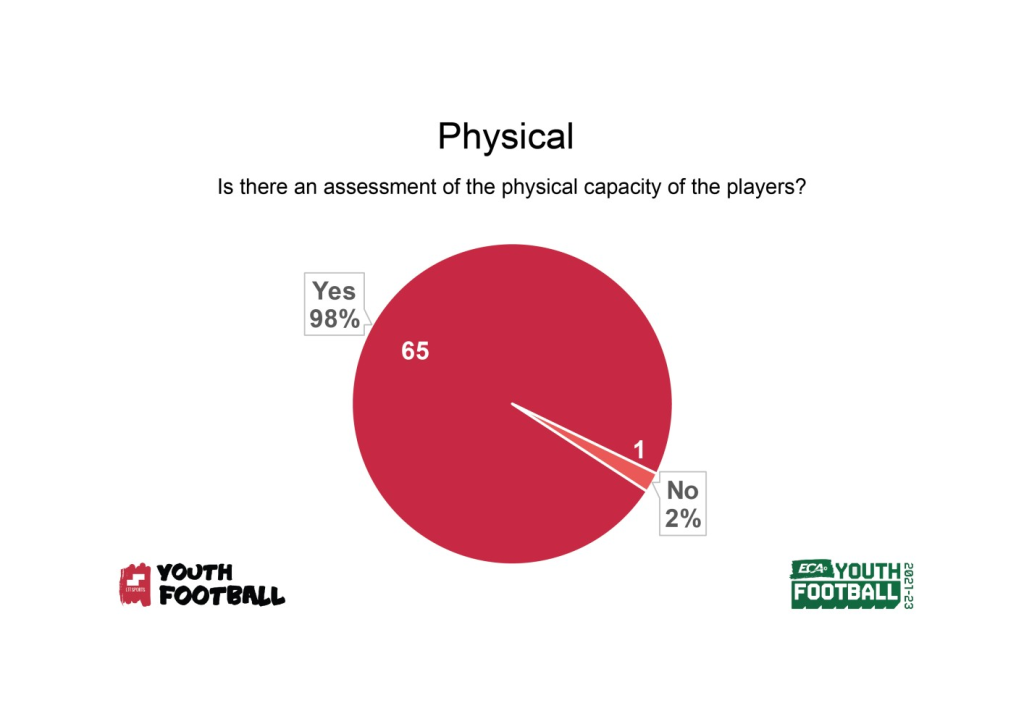
If we see how much clubs do assess players about their physical capacities, we see that 98% of clubs surveyed do assess. There is one club in the survey that didn’t have an academy within the club which means that 100% of clubs that do have an academy assess players on their physical capacities.
If we see how much clubs assess technical capacity (not pure physical) we will see the percentage is less but still high.
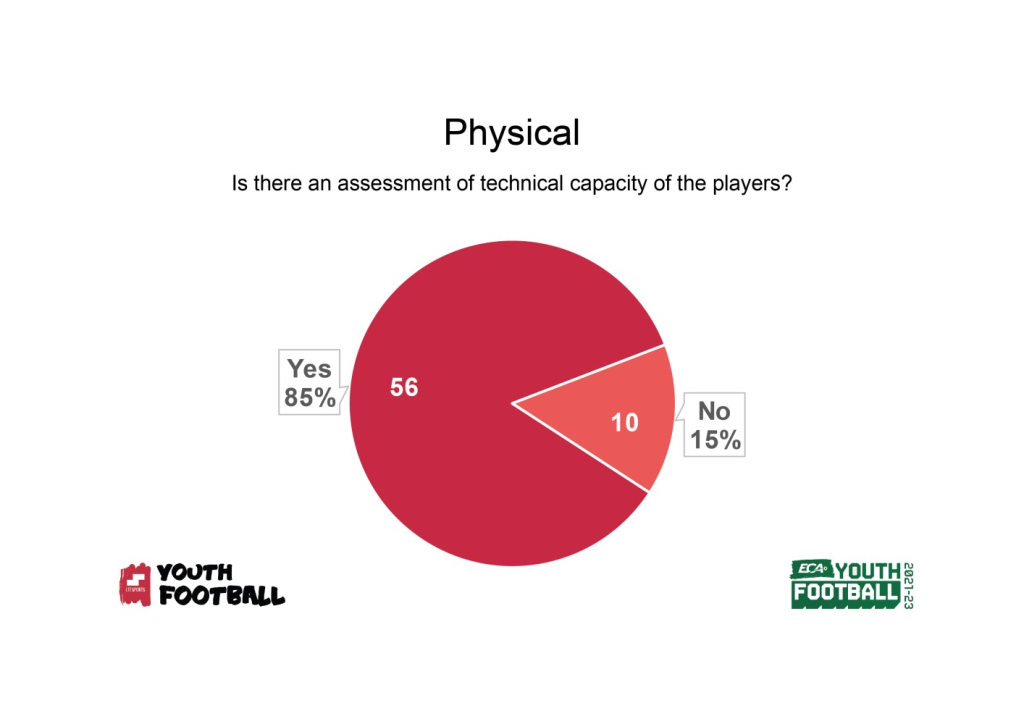
Decision-making
On the other side if we see how much is assessed “decision-making” level we will see that interest is less with more “decision-making” characteristics assessed.
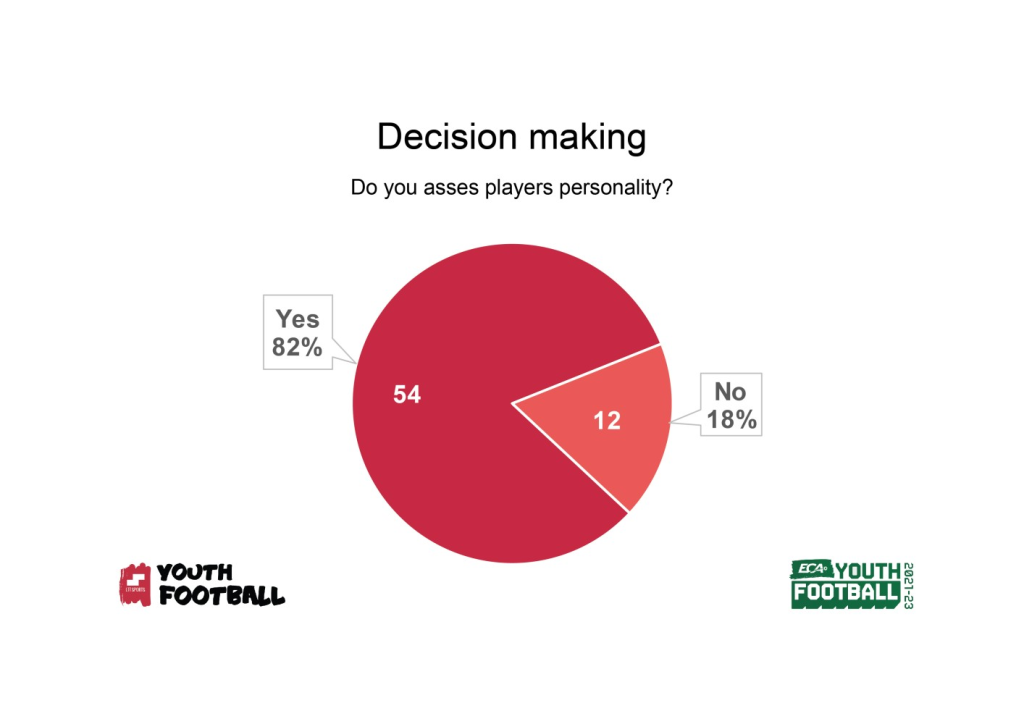
Players’ personality is assessed by 82% of clubs, while any kind of entrance psycho test is done in 35% of clubs.
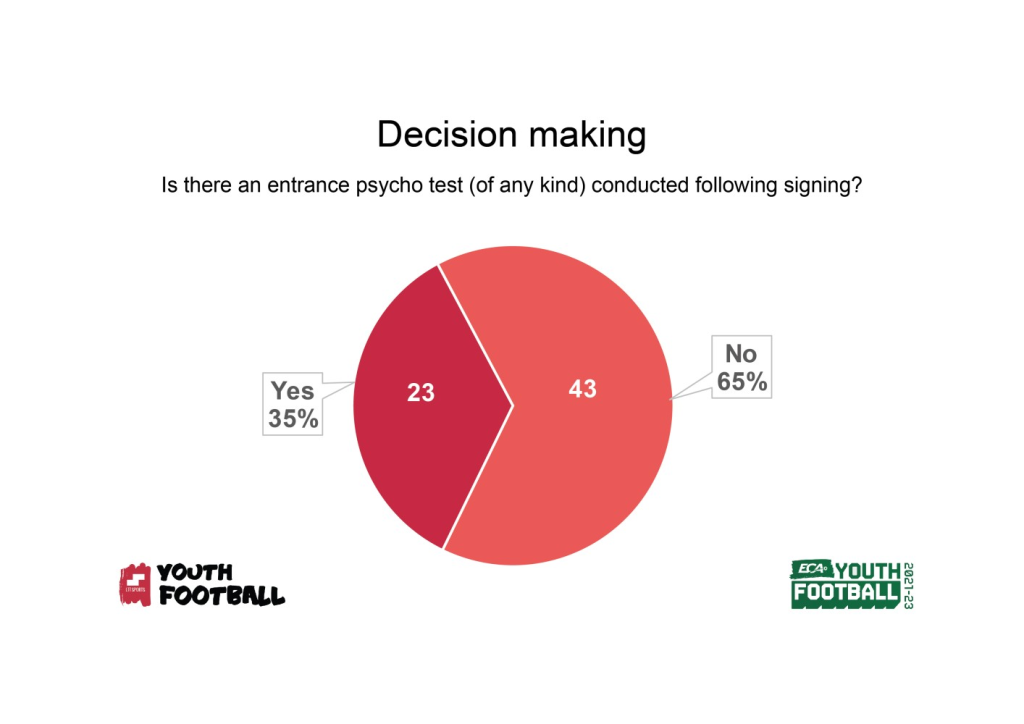
Finally, IQ is measured in just 6% of clubs!
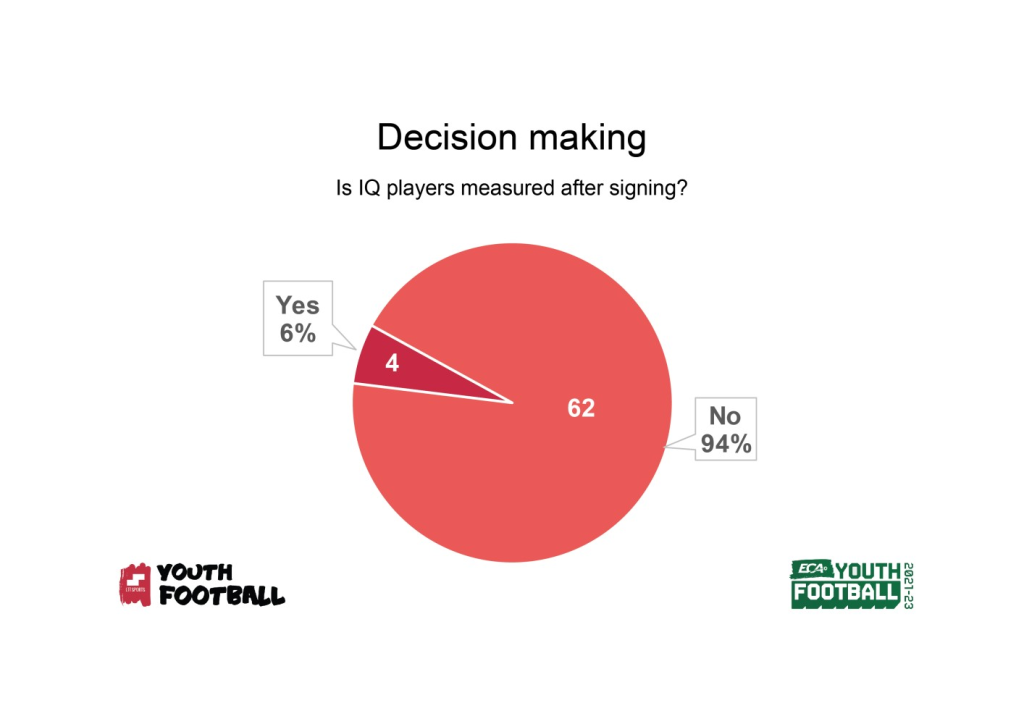
If you want to implement this process within your club, the process could be:
- Create a team that includes coach expert, pedagogue expert and psychology expert at minimum
- Measure IQ and have an assessment of players’ personality after signing (google “assessment center”)
- Make a development plan for each player
- Include players’ characteristics about decision making in his training and players’ game plan
- Regularly measure and report on development.
In the implementation of these processes, it is strongly recommended to have an expert in psychology included in the process.
If you want to see does IQ has an influence on performance on the pitch, I suggest additional reading:
http://aassjournal.com/article-1-910-en.pdf; Nima Nakisa (1), Mahboobeh Ghasemzadeh Rahbardar (2)
(1) Faculty of Physical Education and Sport Sciences, Kish International Campus, University of Tehran, Kish Island, Iran; (2) Mashhad University of Medical Sciences, Mashhad, Iran
https://www.frontiersin.org/articles/10.3389/fpsyg.2021.629827/full James Kenneth Bowman(1)*, R. Thomas Boone(2), Scott Goldman(3) and Alex Auerbach(4);
(1) Great Neck Public Schools, Great Neck, NY, United States; (2) College of Arts and Sciences, University of Massachusetts – Dartmouth, North Dartmouth, MA, United States; (3) Detroit Lions, Detroit, MI, United States; (4) Toronto Raptors, Toronto, ON, Canada
*You can google as well: “IQ and sports performance” “How to develop IQ” “How to improve decision making”
In several next blogs, I will suggest topics that you can use to think about in your football academy. It will be supported by research results, and sometimes by other researchers as well. So how to use this publication? You can use it following this procedure or using specific points of your interest:1. Go through the list of working processes used in the survey and see if you find any working process on the list interesting for you and are willing to work on its implementation (feel free to contact me for a list of working processes if you haven’t saved them from survey)2. Go through lists of most used working processes and see if you have all of them (page 60-61)3. Go through the list of least used working processes and see which you don’t have (page 62-63)4. Go through the list of most correlated processes and try to identify causality for correlation and see how those are working processes relevant in your academy (page 64-67)5. If you find a specific working process especially interesting to you, feel free to contact me to reach out for the list of working processes it is correlated with.6. Go through the list of most recognized indicators of successful transition from academy to the first team and cross-check it with your club (page 70-73). Looking forward to seeing your opinion, ideas and comments!*you can find publication on this link https://www.linkedin.com/posts/slaven-marasovi%C4%87-075b551b_research-based-on-working-processes-in-academies-activity-6909413896734822400-64VV?utm_source=linkedin_share&utm_medium=member_desktop_web Development of playersLet’s see our focus on the development of players from two perspectives: “physical” and “decision-making”. If we see graphs beneath how much we are measuring “physical” and how much do we measure “decision-making” level we can conclude that we are much more focused on “physical” although players using, they physic as well as their “decision making” during the playing and training process. So, we obviously create development plans for the “physical” side but do we have development plans for “decision-making”. If we don’t measure what are players’ strengths and weaknesses in the “decision-making” level how we can help them improve it or can we plan their role on the pitch during the game in the best possible way. When we know weaknesses and strengths (characteristics of players), we can plan development for players but also his or her role on the pitch from both, “physical” and “decision-making” perspective. So, better decision making, better performance on the pitch. I suggest you think and discuss within the club about including measurement of IQ and assessment of player’s personality in your working processes within the academy as well as working on development plans from that perspective! In any business, people are the key to the success so help them to develop as much as possible.Let’s see data from the research about the topic. Physical

If we see how much clubs do assess players about their physical capacities, we see that 98% of clubs surveyed do assess. There is one club in the survey that didn’t have an academy within the club which means that 100% of clubs that do have an academy assess players on their physical capacities. If we see how much clubs assess technical capacity (not pure physical) we will see the percentage is less but still high.

Decision-makingOn the other side if we see how much is assessed “decision-making” level we will see that interest is less with more “decision-making” characteristics assessed.

Players’ personality is assessed by 82% of clubs, while any kind of entrance psycho test is done in 35% of clubs.

Finally, IQ is measured in just 6% of clubs!

If you want to implement this process within your club, the process could be:
- Create a team that includes coach expert, pedagogue expert and psychology expert at minimum
- Measure IQ and have an assessment of players’ personality after signing (google “assessment center”)Make a development plan for each playerInclude players’ characteristics about decision making in his training and players’ game plan
- Regularly measure and report on development.
In the implementation of these processes, it is strongly recommended to have an expert in psychology included in the process. If you want to see does IQ has an influence on performance on the pitch, I suggest additional reading:http://aassjournal.com/article-1-910-en.pdf; Nima Nakisa (1), Mahboobeh Ghasemzadeh Rahbardar (2)(1) Faculty of Physical Education and Sport Sciences, Kish International Campus, University of Tehran, Kish Island, Iran; (2) Mashhad University of Medical Sciences, Mashhad, Iranhttps://www.frontiersin.org/articles/10.3389/fpsyg.2021.629827/full James Kenneth Bowman(1)*, R. Thomas Boone(2), Scott Goldman(3) and Alex Auerbach(4);(1) Great Neck Public Schools, Great Neck, NY, United States; (2) College of Arts and Sciences, University of Massachusetts – Dartmouth, North Dartmouth, MA, United States; (3) Detroit Lions, Detroit, MI, United States; (4) Toronto Raptors, Toronto, ON, Canada
*You can google as well: “IQ and sports performance” “How to develop IQ” “How to improve decision making”